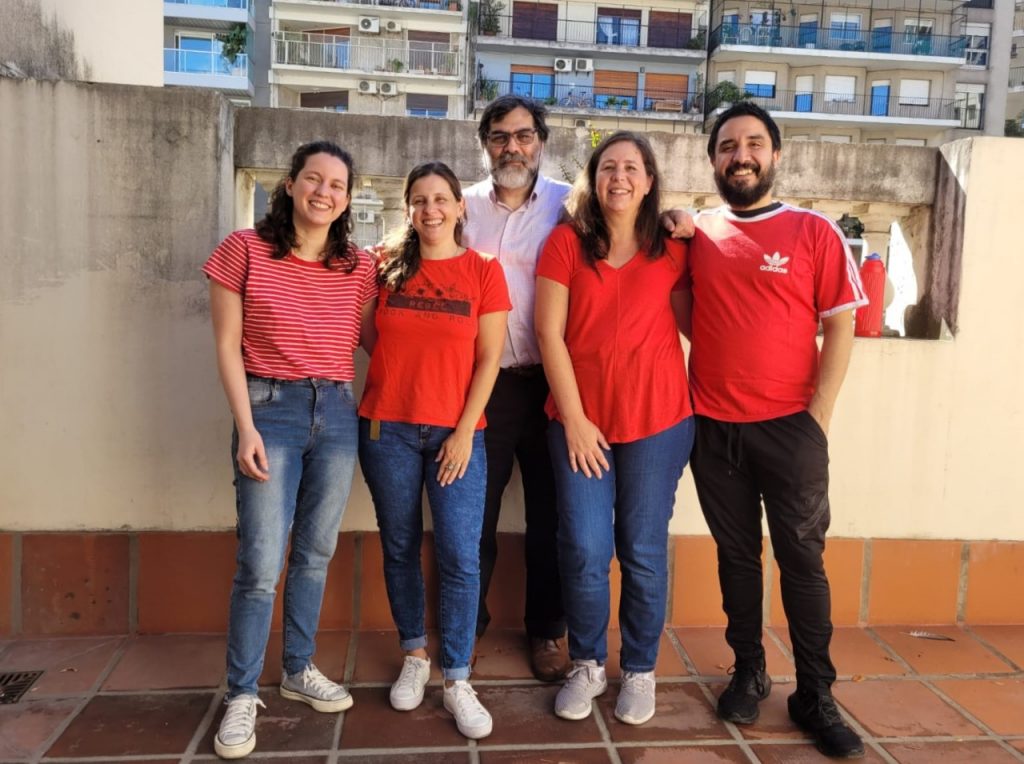
In the genomic era, the Molecular Genetics of Hemophilia Laboratory (LabGMH) focuses on solving practical problems in human genetics and studying the molecular mechanisms that relate the genotype, and epigenotype, with the clinical phenotype observed in women and men of the human population. With this objective, the LabGMH takes Hemophilia A (HA) and B (HB) as an experimental model, paradigmatic X-linked coagulopathies affecting 1 in 5 and 30 thousand male births, respectively. Since its inception, LabGMH has also studied genotype-phenotype relationships in women. Although the number of women with net expression of hemophilia is less than that reported, carriers (whose number more than doubles that of affected men), suffer hematological symptoms that are almost always neglected, even in health systems with sufficient resources, creating a medical problem which must be corrected.
The dissimilar characteristics of the F8 (HA) and F9 (HB) genes are ideal platforms for developing new genetic analysis techniques; and the identification of modifying factors for the expression of recessive X-linked disorders establishes a model to provide the genotypic keys to understand and predict the response of each patient to spontaneous or therapeutic events in her/his life. In addition, the LabGMH has been providing to the Hemophilia community from Southamerica with genetic diagnosis of high international quality since 1995.
Chair : Carlos De Brasi, PhD
: Carlos De Brasi, PhD
Independent investigator – CONICET
Email: cdebrasi@hematologia.anm.edu.ar
 Co-Chair: Liliana Rossetti, PhD
Co-Chair: Liliana Rossetti, PhD
Associate investigator – CONICET
Email: lilianarossetti@yahoo.com.ar

Pamela Radic, PhD.
Assistent investigator – CONICET.
Dir. De Brasi, PhD.
 Martín Abelleyro, PhD.
Martín Abelleyro, PhD.
Assistent investigator – CONICET.
Dir. De Brasi, PhD

Vanina Marchione, PhD.
Becaria Post-Doctoral CONICET
Dir. Dr.De Brasi, Co.Dir. Dra. Rossetti.

Betiana Ziegler, PhD
Genotype-Phenotype relationships in Hemophilia. Genetic basis of inhibitor development, immune-tolerance induction response and discordant FVIII:C assays.
Marchione VD, Radic CP, Ziegler B, De Brasi CD, Rossetti LC.
In hemophilia A and B (HA and HB), the hemophilic phenotype is mainly determined by the F8 and F9 genotype, respectively, with severe, moderate and mild forms of expression, depending on the activity of the clotting factor. More
Mechanisms of X-linked disorders’ expression in females (modeled with Hemophilia carriers). X-Inactivation Skewing: causes, biphasic response and phenotype vs tissue specificity.
Ziegler B, Rossetti LC, De Brasi CD, Radic CP.
As an X-linked recessive disease, hemophilia manifests in the hemizygous male and not in the heterozygous female. However, there are several reports of female carriers with hemophilia as a consequence of extreme skewed inactivation of the X chromosome over the normal F8 or F9 allele. More
Structural variants in the human genome: lessons from hemophilia. Analysis of the SV mechanisms by characterization of breakpoints and bioinformatics of the involved sequences.
Abelleyro MM, Marchione VD, Radic CP, Rossetti LC, De Brasi CD.
Hemophilia A (HA) and B (B) are recessive X-linked coagulopathies, whose maximum clinical severity is caused, in a large percentage of cases, by structural variants (SV) associated with HA, such as the intron 22 inversion (Inv22), of the intron 1 (Inv1) (40-50%) or large F8 deletions (8-15%), and with HB, such as large F9 deletions (3-10%). More
Massive genotyping of structural variants by analysis of juxtaposed sequence pairs in cis in the restriction circles. Physical selection of genomic regions and development of new ad hoc algorithms.
Abelleyro MM, Radic CP, Rossetti LC, De Brasi CD.
Numerous approaches to genomic analysis were developed at the Lab-GMH. Among them, in 2004 the method of inverse shifting-PCR (IS-PCR) was designed, developed and validated for Inv22 genotyping. Currently, IS-PCR is the method of choice in most hemophilia laboratories in the world to investigate the Inv22. More
- Pio MG, Siffo S, Scheps KG, Molina MF, Adrover E, Abelleyro MM, Rivolta CM, Targovnik HM. Curating the gnomAD database: Report of novel variants in the thyrogobulin gene using in silico bioinformatics algorithms. Molecular and Celular Endocrinology. 2021 Aug 20;534:111359. doi: 10.1016/j.mce.2021.111359.
- Gutiérrez LG*, Abelleyro MM*, Ruiz MS, Anchordoqui MS, Freitas J, Bianchini M, De Brasi CD*, Larripa IB* (*equal contribution). Development of an inverse-PCR approach for characterization of the major BCR-ABL1 breakpoint sequences on genomic DNA: proof of concept. Clinical Chemistry and Laboratory Medicine 2021 Jun 23. doi: 10.1515/cclm-2020-1482.
- Luce L*, Abelleyro MM*, Carcione M, Mazzanti C, Rossetti LC, Radic CP, Szijan I, Menazzi S, Francipane L, Nevado J, Lapunzina P, De Brasi CD*, Giliberto F* (*equal contribution). Analysis of complex structural variants in the DMD gene in one family. Neuromuscular Disorders 2021; 31(3): 253-63. doi: 10.1016/j.nmd.2020.11.015. ISSN: 0960-8966.
- Woods AI, Rossetti LC, Paiva J, De Brasi CD, Romero ML, Casinelli MM, Blanco AN, Sánchez-Luceros A. Type 2N von Willebrand disease: Is it always a recessive trait? Thrombosis Research 2021; 198: 49-51. doi: 10.1016/j.thromres.2020.11.029.
- Srivastava A, Santagostino E, Dougall A, Kitchen S, Sutherland M, Pipe SW, Carcao M, Mahlangu J, Ragni MV, Windyga J, Llinás A, Goddard NJ, Mohan R, Poonnoose PM, Feldman BM, Lewis SZ, van den Berg HM, Pierce GF; WFH Guidelines for the Management of Hemophilia panelists and co-authors* (*Al Sharif A, Baarslag MA, Bagley L, Berntorp E, Blamey G, Brooker M, de Paula Careta F, Chew K, Coffin D, De Brasi CD, de Kleijn P, Dolan G, Dumez V, Duport G, Ettingshausen CE, Golob MM, Gouider E, Henry LT, Hum D, Jackson M, Kaczmarek R, Khair K, Konkle BA, Ljung RCR, Montalvão SA, Nedzinskas A, O’Hara S, Ozelo MC, Pasta G, Preza-Hernández DE, Rayner B, Robinson F, Sathyanarayanan R, Schofield TJ, Selvaggi A, Shetty S, Sostack M, Street A, Suwantaroj E, Tagny CT, Toulon P). WFH Guidelines for the Management of Hemophilia, 3rd edition. Haemophilia 2020 Aug;26 Suppl 6:1-158. // Sutherland M, De Brasi CD, Konkle BA, Shetty S, Pierce GF, Srivastava A. Chapter 4: Genetic Assessment. Haemophilia 2020; 26(6):49-58. doi: 10.1111/hae.14046
- Abelleyro MM, Radic CP, Marchione VD, Waisman K, Tetzlaff T, Neme D, Rossetti LC, De Brasi CD. Molecular insights into the mechanism of non-recurrent F8 structural variants: full breakpoint characterization and bioinformatics of DNA elements implicated in the upmost severe phenotype in Hemophilia A. Human Mutation 2020, 41(4):825-36. doi: 10.1002/humu.23977.
- Panek CA, Bruballa AC, Pineda GE, De Brasi C, Fernández-Brando RJ, Mejías MP, Ramos MV, Palermo MS. Cytokines use different intracellular mechanisms to upregulate the membrane expression of CX3CR1 in human monocytes. Molecular Immunology 2019, 108:23-33. doi: 10.1016/j.molimm.2019.01.003.
- Ferri C, Weich N, Gutiérrez L, De Brasi CD, Bengió MR, Zapata P, Fundia A, Larripa I. Single nucleotide polymorphism in PTEN-Long gene: A risk factor in chronic myeloid leukemia. Gene 2019, 694: 71-5. doi: 10.1016/j.gene.2019.01.038. ISSN: 0378-1119.
- Abelleyro MM*, Marchione VD*, Palmitelli M, Radic CP, Neme D, Larripa IB, Medina-Acosta E, De Brasi CD*, Rossetti LC* (* equal contribution). Inverse PCR to perform long-distance haplotyping: main applications to improve preimplantation genetic diagnosis in hemophilia. European Journal of Human Genetics 2019; 27(4): 603-11. doi: 10.1038/s41431-018-0334-9.
- Scheps K, Meyer C, Bestach Y, Enrico A, Bengió R, Rodríguez-Zubieta M, Rivas M, De Brasi CD, Larripa I. Identification of driver and subclonal mutations in ASXL1 and IDH1/IDH2 genes in an Argentine series of patients with myelofibrosis. International Journal of Laboratory Hematology 2018, 40(4):e82-e86. doi: 10.1111/ijlh.12847.
- Abelleyro MM*, Marchione VD*, Elhelou L, Radic CP, Rossetti LC, Neme D, De Brasi CD. (* equal contribution). Somatic/germinal mosaicism of a F8 promoter deletion confounds clinical predictions in a family with haemophilia A: key role of genotype quantitation. Thrombosis and Haemostasis 2018, 118(3):617-20. doi: 10.1055/s-0038-1623536.
- Almejún MB, Borge M, Colado A, Elías EE, Podaza E, Risnik D, De Brasi CD, Stanganelli C, Slavutsky I, Cabrejo M, Fernández-Grecco H, Bezares RF, Cranco S, Burgos RÁ, Sánchez-Ávalos JC, Oppezzo P, Giordano M, Gamberale R. Sphingosine kinase 1 participates in the activation, proliferation and survival of chronic lymphocytic leukemia cells. Haematologica 2017, 102(7): e257-e260. doi: 10.3324/haematol.2017.167353.
- Marchione VD, Zuccoli JR, Abelleyro M, Radic CP, Neme D, Candela M, de Tezanos Pinto M, De Brasi CD, Rossetti LC. A prevalent CTLA4 missense variant significantly associates with inhibitor development in Argentine patients with severe haemophilia A. Haemophilia 2017, 23(2): e166-e169. doi: 10.1111/hae.13194.
- Abelleyro MM, Rossetti LC, de Los Ángeles Curto M, Radic CP, Marchione VD, De Brasi CD. F8 intron 22 inversions and SNP rs73563631 in unrelated families with severe haemophilia A: clinical features and gene testing implications. Thrombosis and Haemostasis 2016, 115(3): 678-81. doi: 10.1160/TH15-08-0643.
- Abelleyro MM, Radic CP, Tetzlaff T, Marchione V, Fundia AF, Larripa IB, Rossetti LC, De Brasi CD. Reliable and cost-effective approach for diagnosis of heterozygous F8/F9 large deletions by quantitative real-time PCR. Haemophilia 2015, 21(3): e247-51. doi: 10.1111/hae.12656.
- Radic CP, Rossetti LC, Abelleyro MM, Tetzlaff T, Candela M, Neme D, Sciuccati G, Bonduel M, Medina-Acosta E, Larripa IB, de Tezanos Pinto M, De Brasi CD. Phenotype-genotype correlations in haemophilia A carriers are consistent with the binary role of the phase between F8 and X-chromosome inactivation. Journal of Thrombosis and Haemostasis 2015, 13(4): 530-9. doi: 10.1111/jth.12854.
PUBLICACIONES CIENTÍFICAS EN REVISTAS NO INDEXADAS.
- Vega-Requena Y, Faguaga M, Abelleyro M, De Brasi C, Bandinelli E, Sans M, Hidalgo P. Inversión de los intrones 1 y 22 del F8 en pacientes con Hemofilia A Severa del Noreste de Uruguay. Archivos de Pediatría del Uruguay 2020, 91(2): 84-9. ISSN 0004-0584.
- Marchione VD, Radic CP, Abelleyro MM, Primiani L, Neme D, Candela M, de Tezanos Pinto M, De Brasi CD, Rossetti LC. El polimorfismo CTLA4Thr17Ala (c.49A>G) se asocia con el desarrollo de inhibidor en pacientes argentinos con hemofilia A severa. Hematología. Vol 20 Nro 3 – septiembre-diciembre 2016: 292-7. Ed. Sociedad Argentina de Hematología. CABA Argentina. ISSN: 0329-0379.
PRODUCCIÓN TECNOLÓGICA PUBLICADA.
NCBI-GeneBank Nucleotide Sequences: “Catalog of F8 and F9 genomic rearrangements in severe Hemphilia A”
- GenBank nucleotide sequence. Accession: MT657364.1 GI: 2035121857. Homo sapiens clone C#1 Xq26.3-q27.2 translocation breakpoint region genomic sequence. Radic CP, Abelleyro MM, Marchione VD, Ziegler BM, Waisman K, Rossetti LC. De Brasi C D. 925 bp linear DNA. May.2021.
- GenBank nucleotide sequence. Accession: MT657363.1 GI: 2035121856. Homo sapiens clone C#2 Xq27.1-q27.2 translocation breakpoint region genomic sequence. Radic CP, Abelleyro MM, Marchione VD, Ziegler BM, Waisman K, Rossetti LC. De Brasi C D. 680 bp linear DNA. May.2021.
- GenBank nucleotide sequence. Accession: MT657362.1 GI: 2035121855. Homo sapiens clone C#3 Xq27.1 translocation breakpoint region genomic sequence. Radic CP, Abelleyro MM, Marchione VD, Ziegler BM, Waisman K, Rossetti LC. De Brasi C D. 863bp linear DNA. May.2021.
- GenBank nucleotide sequence. Accession: MH124165.1 GI: 1407507562. Homo sapiens clone Case#U2 F8 breakpoint region genomic sequence. Abelleyro MM, Marchione VD, Radic CP, Rossetti LC, De Brasi CD. 573 bp linear DNA. Jun.2018.
- GenBank nucleotide sequence. Accession: MH124164.1 GI: 1407507561. Homo sapiens clone Case#949 F8 breakpoint region genomic sequence. Abelleyro MM, Marchione VD, Radic CP, Rossetti LC, De Brasi CD. 1,124 bp linear DNA. Jun.2018.
- GenBank nucleotide sequence. Accession: MH124163.1 GI: 1407507560. Homo sapiens clone Case#945 F8 breakpoint region genomic sequence. Abelleyro MM, Marchione VD, Radic CP, Rossetti LC, De Brasi CD. 848 bp linear DNA. Jun.2018.
- GenBank nucleotide sequence. Accession: MH124157.1 GI: 1407507554. Homo sapiens clone Case#132 F8 breakpoint region genomic sequence. Abelleyro MM, Marchione VD, Radic CP, Rossetti LC, De Brasi CD. 322 bp linear DNA. Jun.2018.
- GenBank nucleotide sequence. Accession: MH124156.1 GI: 1407507553. Homo sapiens clone Case#121 F8 breakpoint region genomic sequence. Abelleyro MM, Marchione VD, Radic CP, Rossetti LC, De Brasi CD. 619 bp linear DNA. Jun.2018.
- GenBank nucleotide sequence. Accession: MH124155.1 GI: 1407507552. Homo sapiens clone Case#51 F8 breakpoint region genomic sequence. Abelleyro MM, Marchione VD, Radic CP, Rossetti LC, De Brasi CD. 782 bp linear DNA. Jun.2018.
- GenBank nucleotide sequence. Accession: MH124162.1 GI: 1407507559. Homo sapiens clone Case#617 F8 breakpoint region genomic sequence. Abelleyro MM, Marchione VD, Radic CP, Rossetti LC, De Brasi CD. 945 bp linear DNA. Jun.2018.
- GenBank nucleotide sequence. Accession: MH124161.1 GI: 1407507558. Homo sapiens clone Case#577 F8 breakpoint region genomic sequence. Abelleyro MM, Marchione VD, Radic CP, Rossetti LC, De Brasi CD. 945 bp linear DNA. Jun.2018.
- GenBank nucleotide sequence. Accession: MH124160.1 GI: 1407507557. Homo sapiens clone Case#575 F8 breakpoint region genomic sequence. Abelleyro MM, Marchione VD, Radic CP, Rossetti LC, De Brasi CD. 728 bp linear DNA. Jun.2018.
- GenBank nucleotide sequence. Accession: MH124159.1 GI: 1407507556. Homo sapiens clone Case#467 F8 breakpoint region genomic sequence. Abelleyro MM, Marchione VD, Radic CP, Rossetti LC, De Brasi CD. 971 bp linear DNA. Jun.2018.
- GenBank nucleotide sequence. Accession: MH124158.1 GI: 1407507555. Homo sapiens clone Case#326 F8 breakpoint region genomic sequence. Abelleyro MM, Marchione VD, Radic CP, Rossetti LC, De Brasi CD. 720 bp linear DNA. Jun.2018.